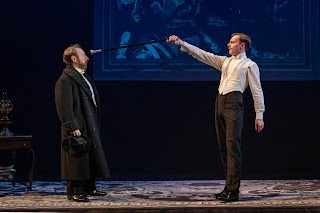Leopoldstadt. A new play by Tom Stoppard.
Directed by Patrick Marber. Set Designer: Richard Hudson, Costume Designer: Brigitte Reiffenstuel, Lighting Designer: Neil Austin, Sound Designer and Original Music: Adam Cork. Movement: Emily Jane Boyle. Casting Director: Amy Ball CDG. Producer: Sonia Friedman Productions. National Theatre Live,
Reviewed by Peter Wilkins
At first I thought that I wouldn’t review the National Theatre Live’s production of Tom Stoppard’s latest work, the sprawling yet deeply personal epic family saga Leopoldstadt. Could I do justice to this vast and yet powerfully intimate and searingly moving account of the lives of a Jewish family in Vienna between 1899 and 1955. It is now over a week since I sat in a Dendy Cinema and braced myself for what I knew would be an emotional journey. I expect that Stoppard must have felt much the same as he sat down to examine the story behind his Jewish ancestry. It was not until he was middle-aged that in 1990 he learnt the truth of his Jewish heritage. It was well documented that England’s leading playwright had escaped from his native Czechoslovakia when he was eight and then after moving to Singapore and India he arrived in England as a Jewish refugee. In the closing scene of Stoppard’s play we meet the adult Leopold (Arty Froushan) a thinly veiled autobiographical creation of Stoppard, who grew up in England, largely unaware of his family history. In a confronting conversation with Nathan (Sebastian Amesto), who survived Auschwitz as a child, Leo is forced to remember his early years and the horrible fates of his family members. The curtain falls on this heart wrenching account of the family’s fate under the Nazi regime as Leo’s Aunt Rosa (Jenna Augen) reads out a roll call of the deaths of the family at Verdun in 1918, by suicide in 1938, at concentration camps during the war years and by suicide in 1946. It is a tragedy that must never be allowed to be forgotten.
Stoppard is the master storyteller. This is a profoundly personal story and we see the members of the family in good times, at religious ceremonies, behaving as any family might, At first it may be confusing to work out who is who. The relationships are convoluted, but as the time periods move forward and the characters age while new members of the family are born and grow, we become attuned to the family tree, and who is part of industrialist Merz’s family and who is related through birth and marriage. With masterful depiction, Stoppard allows each character to emerge as an independent person, one might even say a clearly drawn family stereotype. This is not a cliché, for each character is drawn from life and more significantly from the life of Stoppard’s family. There are scenes of great warmth, of comedy, of pathos and of terror. A chilling scene with the Nazi official who evicts the family and confiscates their house and belongings is played with startling, heart stopping authenticity by a magnificent ensemble who vividly bring to life not only Stoppard’s story but the stories of all who were persecuted and suffered under the Nazis. Some managed to flee to England. Some to America. I gaze at a photo on my study wall of my mother’s family. She fled Czechoslovakia just before Hitler invaded her homeland. I never knew most of the faces in the photo. I did know their fates. Their story is Stoppard’s story. Their fate, the terrible fate of many of the young Tomas Straussler’s family. It is the fate of many of those who appear on the slides that director Patrick Marber has included in this production. There is no need for any graphic slide of the Holocaust victims. The fear and the terror are only too real in the magnificent performances by the cast.
Stoppard’s ability to weave his plot through the lives of so many members of the Merz family and preserve the fullness of their character and the reality of their experience is the skill of a master playwright who keeps us glued to the character and the story. At times we may wish to look away, to deny the horror, escape the uncomfortable truth but ultimately we are left with overwhelming empathy and a desperate hope that such events may never happen again. But then, Leopoldstadt is a warning that there is no guarantee, which is why Sir Tom Stoppard’s first play in five years is a masterpiece which under Marber’s direction of his superb National Theatre cast and creatives must not be missed.



